Plastic-free and plastic-restricted meals: the internal and external contradictions of Hong Kong's new environmental policy – BBC News
- Ye Jingsi
- BBC Chinese reporter reports from Hong Kong
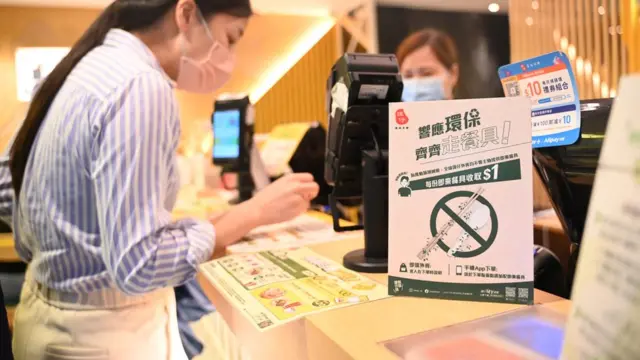
Image source,AFP
On a street in a market in Hong Kong, a couple in their 40s just walked out of a dim sum takeaway shop. In the plastic bag were two boxes of the classic Cantonese “盅頭饭” and a stack of spoons – the reason I say “a stack” is because they were made of paper.
“If we take it back, we will just throw it away. I'll use the tableware at home anyway.” The husband said calmly, but this sentence implies that a disposable (disposable) tableware will end up in the trash without even having the chance to be used.
“Plastic ban” has gradually become popular around the world. On April 22, Hong Kong took advantage of World Earth Day to implement a policy of “controlling disposable plastic tableware and other plastic products”, which is also known as the “plastic ban”. Some foreign media or Internet celebrities even described it as “the strictest plastic ban in history”. Now this policy has reached its full month.
However, the replacement of disposable plastic tableware with paper and wooden ones has caused a lot of grief online, and some restaurants have not made any moves during the first six months of implementation as they are in the adaptation period. What went wrong?
What is the content of Hong Kong’s “plastic-free” policy?
In October 2023, the Legislative Council of the Hong Kong Special Administrative Region of China passed the Product Eco-responsibility (Amendment) Bill 2023. The SAR government is scheduled to implement the first phase of the ban on sales on April 22, 2024.
In the first phase, items that are banned from sale or provided for free include a variety of plastic tableware, such as plates, bowls, lunch boxes made of various types of foam plastic (i.e. expanded polystyrene (PS), commonly known as styrofoam in Taiwan), as well as straws, forks, knives, spoons, etc. Hotels are also prohibited from providing disposable plastic toothbrushes, razors, shower gel, shampoo and bottled water for free.
This article contains content provided by Instagram. Because these contents use technologies such as cookies, we will ask for your consent before loading any content. You may wish to read Instagram's Cookie Policy and Privacy Policy before giving your consent. If you wish to read the above, please click “Accept and Continue”.
Ending Instagram Posts, 1

The second phase is tentatively scheduled to be implemented in 2025, when disposable plastic cups, lunch boxes, etc. will be further banned. However, the Hong Kong government said the specific ban time “will depend on the popularity and affordability of the relevant types of non-plastic or reusable alternatives.”
The Hong Kong government designated the first half of the first phase of the ban as an “adaptation period”, after which businesses violating the “plastic ban” could be fined between HK$2,000 and HK$100,000 (US$12,800; RMB 90,700; NT$412,000). However, there are exceptions, such as providing plastic straws to people with medical needs.
Restaurants began to switch to new takeout tableware around April 22. As a result, citizens began to post complaints online about wooden spoons not being able to drink soup, paper straws melting, and paper forks breaking before use.
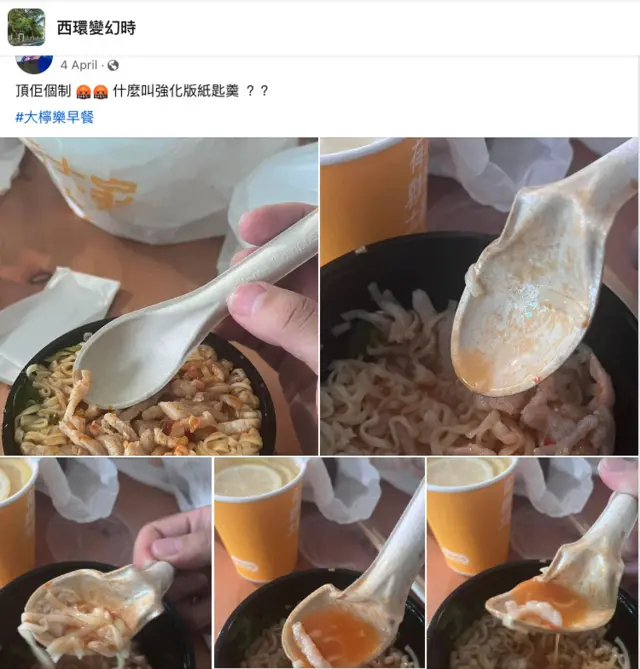
Image source,@westerndistrict/Facebook

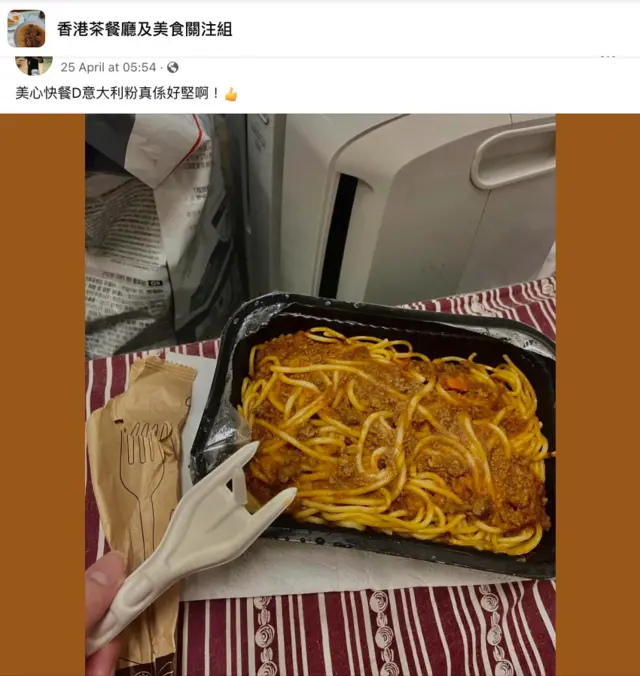
Image source,@chachantang/Facebook

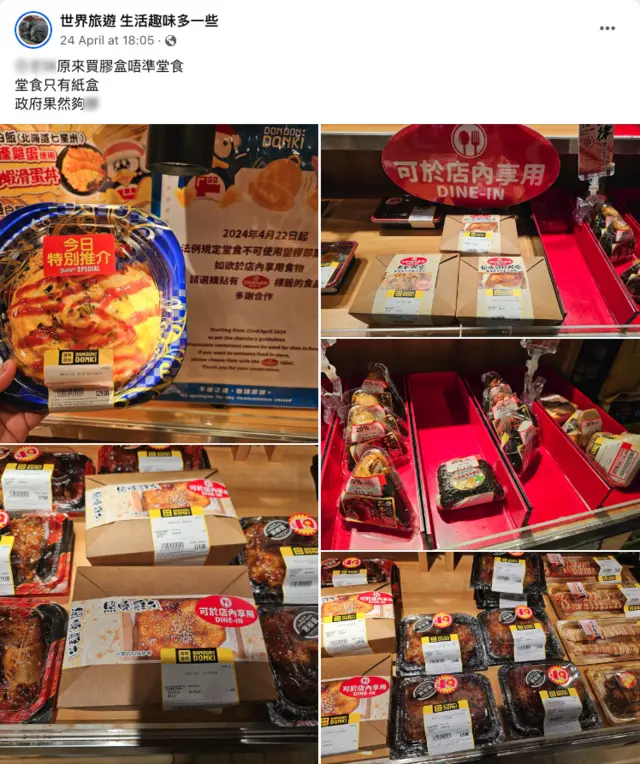
Image source,@KOCREAM/Facebook

“I have been using my own tableware for a year or two,” the man holding the takeaway rice bowl told the BBC Chinese reporter. He said he was used to it, “but it would be more convenient to use the plastic tableware we used to use.”
Pang King-wai, who runs a two-course rice takeaway shop in Kam Tin, Yuen Long, and whose family also runs a tea restaurant in Hung Shui Kiu, a small town in the same district, said an increasing number of takeaway customers are giving up on asking for cutlery.
He told the BBC Chinese reporter: “The cutlery sets have become more expensive… but the biggest reason is that users – diners – feel that these new takeaway cutlery can't help them eat and are troublesome, so they simply don't use them.”
The SAR government stressed that it has provided support to the industry in purchasing alternative tableware, and some media reported that the price of new disposable takeaway tableware is almost the same as that of plastic tableware, but Pang Jingwei said that the paper-wrapped tableware set used in his store – which contains a pair of bamboo chopsticks, a paper spoon, a toothpick and a napkin – costs twice as much as before. Before the plastic restriction order, the common disposable Chinese tableware sets were packed in plastic bags, and the spoons were plastic.
Hong Kong Chief Executive John Lee said on April 30: “Over the period of time since the introduction of the measures, I have seen a smooth and orderly progress, and citizens, whether they are eating takeaway or dining in, have gradually adapted to the new 'plastic-free' requirements.”
“I have also seen that a large proportion of the public – reports indicate around 60% to 70% of people – often do not use disposable utensils when dining in or ordering takeaways, and I have also seen an increase in the number of people buying reusable personal utensils.”
This article contains content provided by Google YouTube. As these contents use technologies such as cookies, we will ask for your consent before loading any content. You may wish to read the Google YouTube Cookie Policy and Privacy Policy before giving your consent. If you wish to read the above, please click “Accept and Continue”.
Notice: Third-party content may contain advertisements
End of YouTube Post, 1

This article contains content provided by Google YouTube. As these contents use technologies such as cookies, we will ask for your consent before loading any content. You may wish to read the Google YouTube Cookie Policy and Privacy Policy before giving your consent. If you wish to read the above, please click “Accept and Continue”.
Notice: Third-party content may contain advertisements
End of YouTube Post, 2

Is it wrong for Hong Kong to go plastic-free?
A document submitted by the Environment and Ecology Bureau to the Legislative Council in February this year stated that “'Reducing plastic' and 'going plastic-free' have become an international consensus in recent years. Whether it is the Mainland (Chinese mainland), neighboring Macau, or other parts of the world, measures to reduce the use of plastic have been implemented in recent years,” such as the European Union and Australia.
After the UK completely left the EU at midnight Brussels time on New Year's Day 2021, Northern Ireland, which still partially complies with EU regulations, banned disposable plastic tableware and utensils from July 2021. Scotland implemented a similar ban from January 2022, and England, Wales and the Isle of Man will implement it in the second half of 2023.
The United Nations held the fourth round of negotiations on plastic pollution (INC-4) in Ottawa, Canada at the end of April. This series of negotiations aims to reach an internationally legally binding global agreement within this year to end plastic pollution. This shows that “plastic restriction” has increasingly become a global consensus.
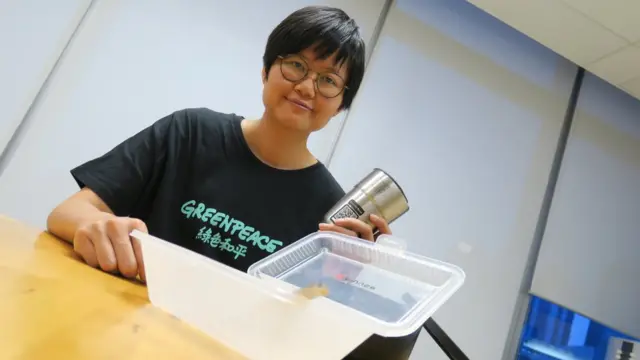
Image source,BBC News Chinese
Hong Kong’s “plastic-free” policy started later than others, and it seems to have started out “out of shape”.
“I remember that in the past, if I dine in these fast food chains, they would give me a stainless steel spoon. Now there is no such spoon, only a wooden stick,” said Dr. Shanshan Zhong, a senior lecturer in the Department of Biology at Hong Kong Baptist University, who stopped at a fast food restaurant to buy a cup of lemon tea one day, talking about this recent experience.
Dr. Chung Shan-shan is also the chairman of the board of directors of the Hong Kong-based environmental organization, the Chang Chun Society. She told the BBC Chinese reporter: “If everyone still insists on saying 'I want to use disposables', whether dining in or not, and thinks that disposable tableware can be used as long as it is not plastic, then we are actually not environmentally friendly at all.”
Of course, there are precedents where the “plastic ban” was launched in chaos or criticized for being distorted after implementation. As the implementation of the disposable plastic tableware ban in England and Wales is imminent, many people in the catering industry have said that they know very little about the new policy.
Taiwan, which has been praised by some Hong Kong environmental groups for its active “plastic-free” approach, implemented a ban on disposable straws for domestic use on July 1, 2019, and is expected to restrict the supply of straws for takeout in 2025. When the policy was first announced, there were comments from the Environmental Protection Agency officials that bubble tea “can be drunk with a spoon” and then-Taipei Mayor Ko Wen-je that “just open your mouth”, which caused heated public debate. When the Environmental Protection Agency was about to be upgraded to the Ministry of Environment in August 2023, officials announced that a complete ban on disposable plastic tableware in 2030 “is no longer the only direction”, which attracted a lot of criticism. As a result, in April this year, Minister of Environment Xue Fusheng reiterated the policy goal of banning and restricting the use of plastic products in 2030.
South Korea is perhaps the worst example so far: the ban on disposable paper cups and plastic straws was implemented in November 2022. As the first year of the transition period was about to end, the ban on paper cups was announced to be abolished, while the transition period for plastic straws was actually extended indefinitely. Local media said that the policy reversal was due to the operational difficulties faced by small businesses.
Greenpeace East Asia project director Tam Yinglin believes that the pain of implementing the “plastic-free” policy is inevitable, “but it is greater than expected.” She told the BBC Chinese reporter: “Some people misunderstood and said 'all takeaways cannot use plastic', even bubble milk tea. There is a gap in the information received by citizens. Many people feel, 'Huh? What happened?' So they are very opposed.”

Image source,YONHAP/EPA
Moreover, the fact that “new is not as good as old” in substitutes is not just about whether they are easy to use or not.
Dr. Zhong Shanshan said: “It is impossible for paper to be waterproof. To make it waterproof, something must be added. What is added? Those waterproofing agents and water-slip agents are all toxic and harmful to the human body.”
Members of the Legislative Council of the Hong Kong Special Administrative Region also asked the government to explain this. Secretary for Environment and Ecology Tse Chin-wan replied in writing on May 8: “According to the data in the report, citizens need to continue to consume a large amount of all PFAS in the straws – about 300 straws per person per week – to exceed the PFAS tolerable intake limit set by the European Food Safety Authority, so under normal circumstances there is no need to worry about this.”
Xie Zhanhuan also said before: “About a week after the 'plastic-free' campaign began, our colleagues found that more than half of the stores had switched to non-plastic tableware during inspections, and all large chain restaurants had switched. We think the speed is ideal.”
Reasons for Hong Kong to go plastic-free
In December 2023, the Environmental Protection Department of the Hong Kong Special Administrative Region released the solid waste statistics for 2022: Hong Kong people discarded 4.06 million metric tons of municipal solid waste throughout the year, an average of 11,100 metric tons per day, of which waste plastic accounted for 21%; 227 metric tons of plastic and foam tableware, 206 tons of plastic bottles, and 878 tons of plastic bags were discarded every day.
The most common 12-meter double-decker bus in Hong Kong has a capacity of about 130 people. Based on the assumption that each person weighs 54 kilograms when inspecting the vehicle by the Hong Kong Special Administrative Region Transport Department, the plastic waste discarded in Hong Kong in a day requires 187 double-decker buses to transport away, which means 11,800 buses a year.

Image source,Reuters
On the other hand, the global plastic recycling rate is already very low, and Hong Kong's recycling rate in 2022 was only slightly higher at 12.27%.
A paper published in July 2017 by Prof Roland Geyer, professor of industrial ecology at the University of California, Santa Barbara, pointed out that only about 9% of plastic waste in the world is recycled, the remaining 12% is incinerated, and 79% is thrown into landfills.
Professor Wu Meiqin, Director of the Urban Studies Program at the Department of Geography and Resource Management at the Chinese University of Hong Kong, has long studied Hong Kong's environmental protection issues from the perspective of urban planning. She believes that when it comes to the issue of “going plastic”, citizens must realize the reality that “garbage is expensive”. “This is a process that requires thinking and reorganizing values.”
Expensiveness also exists in the recycling cycle – Dr. Shanshan Zhong of Baptist University said that the recycling of plastic products, from collection, cleaning to remaking new products, requires money, but does not necessarily bring good returns.
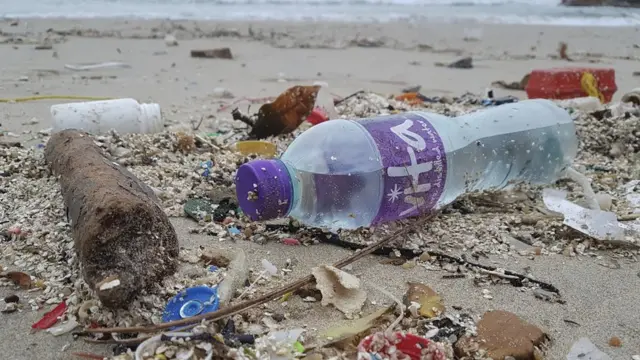
Image source,South China Morning Post via Getty Images
The issue of microplastics pollution in the human food chain has received increasing attention in recent years. Studies have shown that these plastic particles can enter the human blood, lymphatic system and even liver, and their health effects remain to be understood. Plastic recycling is also a source of pollution.
Dr Zhong Shanshan said: “By the time we know what permanent effects microplastics can have on organisms, it will be too late.”
Professor Wu Meiqin also said: “The richer the place, the greater the ability to bear the consequences, which will eventually lead to justice issues: poor places don't have so many resources. When you use so many resources and cause many environmental problems, the ones who suffer the most are those who don't have the resources to deal with the problems.”
How should Hong Kong continue to go plastic-free?
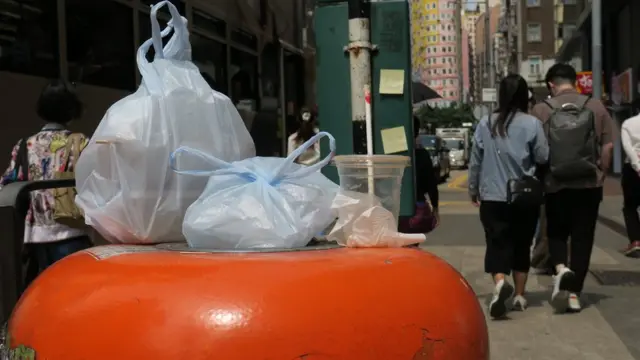
Image source,BBC News Chinese
In fact, “plastic-free” is only part of Hong Kong's overall waste reduction policy. The municipal solid waste charging scheme, which was originally scheduled to be implemented at about the same time, was postponed to August 1 at the beginning of the year, and the government departments and selected residential buildings will “pilot” it from April 1. Hong Kong media are still waiting to see whether the garbage charging measure can be implemented as scheduled.
However, Greenpeace's Tam Ying-lin said: “We can't just ask consumers to be environmentally friendly, just ask consumers to recycle, and ask them to provide their own. Merchants should also go a step further and provide them.” This involves implementing the “producer responsibility system”, including the problem of “excessive packaging” by merchants – examples given by different environmental groups include supermarkets selling large quantities of packaged fruits and vegetables, or using multiple mailing packages for online shopping.
Dr. Shanshan Zhong of Baptist University mentioned that the “package meal” service, also known as “lucky food”, which was popular in Hong Kong before the 1970s, could be considered for reintroduction. At that time, restaurants and stalls used traditional tableware to deliver lunch to businesses and factories, and the tableware was collected after the meal, without any disposable products involved. In addition, following the principle of “polluter pays”, increasing the mandatory charge for requesting disposable tableware can also reduce consumers' willingness to use it.
Tam Wing-lin also said that the growth of green industries will drive the development of the internal circulation of Hong Kong's economy: referring to EU data, under its 2009 Ecodesign Directive, EU consumers saved 120 billion euros (130.7 billion US dollars; 944.5 billion yuan; 4.21 trillion New Taiwan dollars) in energy costs in 2021 alone.
But to achieve these economic benefits, we must first deal with the current chaos.
Tan Yinglin said: “I actually think that everyone is constantly giving opinions to save the entire policy together. Just think about it, in the past 20 years, has there ever been a garbage problem that has been on the news headlines for so many days?”
Professor Wu Meiqin also hopes that politicians can understand the reasons for public opposition and prescribe the right remedy. But she still hopes that citizens can understand the importance of implementing the “plastic restriction” policy.
“Don't be angry, because this really concerns everyone's long-term well-being, and this is something everyone needs to understand.”
The Hong Kong SAR government proposed the implementation of the “Glass Beverage Container Producer Responsibility Scheme” and the “Plastic Beverage Container Producer Responsibility Scheme” in its “Hong Kong Resource Recycling Blueprint 2035”. The control of glass beverage containers has been implemented in May 2023, and the draft legislation for the control of plastic beverage containers is still being drafted. These actions and other waste reduction measures are aimed at cooperating with the “Hong Kong Climate Action Blueprint 2050” to “strive to achieve carbon neutrality by 2050.”
Many environmental groups are waiting to see whether this goal can be achieved.
